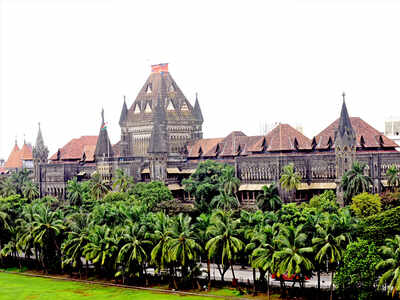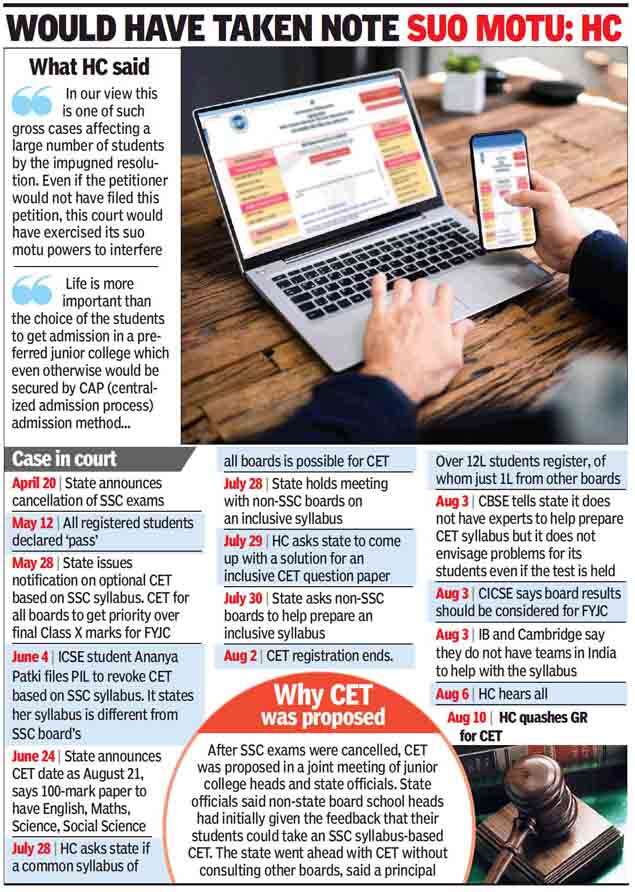Top Searches
- News
- City News
- mumbai News
- Bombay HC junks CET, tells state to conduct FYJC admissions on Class X scores
Bombay HC junks CET, tells state to conduct FYJC admissions on Class X scores

File photo of Bombay high court
MUMBAI: The Bombay HC on Tuesday set aside the state government’s notification to hold a Common Entrance Test for admissions to junior colleges, saying the state “exceeded its power” by imposing a condition that affected the eligibility of non-state board students.
A bench of Justices Ramesh Dhanuka and Riyaz Chagla ruled on a plea by ICSE student Ananya Patki and an intervention plea by four IGCSE students who challenged a May 28 GR that said admissions to class XI will be decided by a CET based solely on the SSC board syllabus.

“In our view, such a condition is arbitrary, harsh, capricious and without authority of law,” the judges said. The state is directed “to issue appropriate order” cancelling CET in 48 hours and “complete the process for admission on the basis of marks secured in Std X by evaluation/internal assessment within maximum 6 weeks”, the HC added.
The judges said there is no provision in the Maharashtra Secondary and Higher Secondary Education Boards Act, 1965 and in its Rules for a CET. Under the guise of issuing an executive order under article 162 (extent of executive power of State), the government could not override the statute and rules related to eligibility criteria, they added.
Life is more important than choice of jr college, says HC
Setting aside the government’s notification to hold a CET for FYJC admissions, the Bombay HC on Tuesday said the state acted contrary to the provisions of the Maharashtra Secondary and Higher Secondary Education Boards Act, 1965 and its Rules and “exceeded its power by issuing the government resolution thereby putting embargo or such condition which would affect the right of such students from other boards to get admission in junior colleges affiliated to the State board as per their choice as per marks secured by them.”
A bench of Justice Ramesh Dhanuka and Justice Riyaz Chagla aid that by imposing a condition that other board’s students appear in a CET based on the SSC syllabus and that priority be given to those who appear for CET in the first phase of admission, the state government “has deprived the students from other statutory boards to compete with the students of the State board.”
The high court said due to the GR, students “who are waiting to start their second inning by taking admission in junior college are suffering mental trauma, anxiety and tension.” They noted that though the GR was issued on May 28, the date for conduct of CET and syllabus were announced recently. They said commencement of the academic year would be delayed if CET is allowed and it will “cause gross injustice" to all the students including those of State board.
Some “10.98 lakh” had registered for the optional CET to be held on August 21.
The judges accepted submissions by Ananya’s father, advocate Yogesh Patki, and senior advocate Mihir Desai for the intervenors that HC has ample power to grant consequential relief if the GR is set aside. “The centralised admission process (CAP) can be followed for this year also,” they added.
The judges said the CAP, which has been in operation for the last several years, is based on merit-cum-choice. They disagreed with advocate general Ashutosh Kumbhakoni that under the CET, students will be similarly considered. They were “not impressed’ with his submission that a CET of two hours will not prejudice students. The judges said students who are not vaccinated for Covid-19 are being forced to appear for a CET and more particularly in violation of SOPs issued.
They would “carry a risk to their life by exposing themselves” if they take the CET. “Life is more important than the choice of the students to get admission in a preferred junior college which even otherwise would be secured by CAP admission method subject to the merits of each student,’’ they added.
They took note that ICSE, CBSE and IGCSE boards in their letters to the State “had agreed to participate in the CET examination willingly or unwillingly and have given suggestions to do away with” the CET for various reasons.
“In view of the protest made by those boards also, in our view, no purpose and object would be achieved if CET examination is allowed to be held,” the judges concluded. They rejected the State’s request to stay the verdict, “considering the facts involved and the right to life of lakhs of students.”
A bench of Justices Ramesh Dhanuka and Riyaz Chagla ruled on a plea by ICSE student Ananya Patki and an intervention plea by four IGCSE students who challenged a May 28 GR that said admissions to class XI will be decided by a CET based solely on the SSC board syllabus.

“In our view, such a condition is arbitrary, harsh, capricious and without authority of law,” the judges said. The state is directed “to issue appropriate order” cancelling CET in 48 hours and “complete the process for admission on the basis of marks secured in Std X by evaluation/internal assessment within maximum 6 weeks”, the HC added.
The judges said there is no provision in the Maharashtra Secondary and Higher Secondary Education Boards Act, 1965 and in its Rules for a CET. Under the guise of issuing an executive order under article 162 (extent of executive power of State), the government could not override the statute and rules related to eligibility criteria, they added.
Life is more important than choice of jr college, says HC
Setting aside the government’s notification to hold a CET for FYJC admissions, the Bombay HC on Tuesday said the state acted contrary to the provisions of the Maharashtra Secondary and Higher Secondary Education Boards Act, 1965 and its Rules and “exceeded its power by issuing the government resolution thereby putting embargo or such condition which would affect the right of such students from other boards to get admission in junior colleges affiliated to the State board as per their choice as per marks secured by them.”
A bench of Justice Ramesh Dhanuka and Justice Riyaz Chagla aid that by imposing a condition that other board’s students appear in a CET based on the SSC syllabus and that priority be given to those who appear for CET in the first phase of admission, the state government “has deprived the students from other statutory boards to compete with the students of the State board.”
The high court said due to the GR, students “who are waiting to start their second inning by taking admission in junior college are suffering mental trauma, anxiety and tension.” They noted that though the GR was issued on May 28, the date for conduct of CET and syllabus were announced recently. They said commencement of the academic year would be delayed if CET is allowed and it will “cause gross injustice" to all the students including those of State board.
Some “10.98 lakh” had registered for the optional CET to be held on August 21.
The judges accepted submissions by Ananya’s father, advocate Yogesh Patki, and senior advocate Mihir Desai for the intervenors that HC has ample power to grant consequential relief if the GR is set aside. “The centralised admission process (CAP) can be followed for this year also,” they added.
The judges said the CAP, which has been in operation for the last several years, is based on merit-cum-choice. They disagreed with advocate general Ashutosh Kumbhakoni that under the CET, students will be similarly considered. They were “not impressed’ with his submission that a CET of two hours will not prejudice students. The judges said students who are not vaccinated for Covid-19 are being forced to appear for a CET and more particularly in violation of SOPs issued.
They would “carry a risk to their life by exposing themselves” if they take the CET. “Life is more important than the choice of the students to get admission in a preferred junior college which even otherwise would be secured by CAP admission method subject to the merits of each student,’’ they added.
They took note that ICSE, CBSE and IGCSE boards in their letters to the State “had agreed to participate in the CET examination willingly or unwillingly and have given suggestions to do away with” the CET for various reasons.
“In view of the protest made by those boards also, in our view, no purpose and object would be achieved if CET examination is allowed to be held,” the judges concluded. They rejected the State’s request to stay the verdict, “considering the facts involved and the right to life of lakhs of students.”
FacebookTwitterLinkedinEMail
Start a Conversation
end of article

